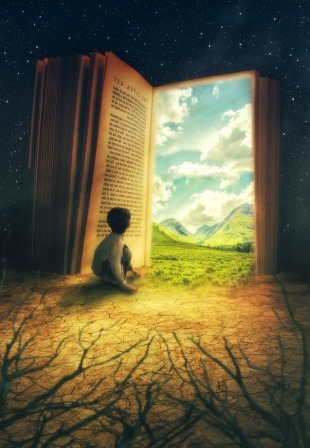Is there value in reading fiction? Some people would have you believe reading fiction is a frivolous, selfish, waste of time. Some may even go so far as to lay a guilt trip on you for hanging out with imaginary friends or not reading books with real-life, pertinent information.
There is more to fiction-reading than just entertainment. A good story can provide us with a much-needed break from life’s stresses. What we might not realize is that when we seek to relax or escape by reading, our subconscious is processing and storing valuable information.
So the next time someone complains about your story reading or those voices in your head start nagging you to read serious material, remember these six benefits for reading fiction.
Benefit #1: Fiction-The Escape Door to Cure Our Ills

When George Samsa awakes to find he’s morphed into a human sized beetle it may be hard for us to think there is anything with Franz Kafka’s character in, “The Metamorphosis,” that we can relate to. We settle into this odd story with the idea of a complete escape.
But as the story continues and we feel a light tinge of empathy for this poor sap, as creepy looking as he is, our empathy may shift from him, to us. For as George feels helpless to continue providing for his family and must endure their growing contempt for him, incidents in our own lives may crawl to the surface.
Like George, we remember all our efforts to plan a vacation within budget that everyone grumbled about. Or maybe it was skipping lunch to attend an early soccer match or knowing that we’d be up late to finish a costume for a school play, only to hear complaints about the dinner we’ve cooked.
Reading further into the story we may see that we’ve made some of the same mistakes George Samsa made. We realize we must re-train our family to not rely solely on us but start providing for themselves.
Though we set out to escape from the stress and problems of life, we may find, depending upon the story we’ve read, that our attempt to relieve stress and boredom was more productive than we thought.
For centuries people have understood the healing power of story. All good literature affects us, especially when we identify with the characters. It is this identification and the safe venue where readers can experiment with new ideas that lead some psychotherapists to use what is called, bibliotherapy.
Bibliotherapy involves reading books and other material, including fiction to help solve personal problems or in conjunction with psychiatric therapy.
Maybe what ails you are certain social situations. Rather than heady self-help books, novels teach with the idea that, “More is caught than taught.” Fiction offers us examples of how to get along with others and how not to. Sometimes, when characters make grave errors we feel their pain and carry it with us as life lessons on how to navigate society.
Benefit #2: Stories Help Us Better Understand Ourselves

Good fiction forces us to explore our own world of experiences, reality, and beliefs. Stories give us insight into how and why we say and do the things we do—both good and bad. Stories can unlock memories that can help us understand our likes, dislikes, and choices.
When we look at life through our own single vision lens we miss the insight and possibilities others give through their experiences and understanding.
Stories that deal with tough issues often force us to face and even fight our demons. Understanding why we do what we do is an important step. Identifying with someone in the same boat can help us see the issue from a different perspective.
In Claire Davis’ novel, Season of the Snake, scientist and rattlesnake attrition specialist, Nancy Able, is forced to deal with family problems avoided since childhood. But while Nancy sorts through her own past, her husband’s predatory obsession surfaces.
Davis, has had many women tell her they can identify with the character, Nancy Able. Such an identification can help the reader determine their own reasons for falling prey to abuse.
From hoarding to reckless living to even craving a particular scent or flavor, we all do things for reasons sometimes beyond our own understanding. Because the human experience is, in many ways similar, no matter what problem we are struggling with, we can find a story whose character faces a similar predicament.
In the comfort of our own minds we can, often unconsciously, sort through our memories and emotions, maybe even discovering why we respond as we do to particular situations, sights, sounds, smells, or people.
We never know, when we pick up an innocuous looking novel if it might just be the book that changes our lives.
Benefit #3: Fiction Feeds Our Craving for Adventure And is Cheaper Than a Vacation

Let’s face it, sometimes our lives can seem boring and we crave a change of scenery and adventure.
Reading action adventure stories transports us to different locations with intriguing situations. It causes our blood pressure to rise and gives us cause to think about our own safety—if we were in such a situation. As humans, our default mode is self-preservation. When we read stories about characters facing difficulties and danger our minds pick up on this and store information on how that character survives for our own future use—if we should need it.
Some fiction melds our desire for adventure with interesting places, often providing a more adventurous experience than any travel agent could conjure.
In Anne Fortier’s bestselling novel, Juliet readers experience the fear of not knowing who to trust when American, Julie Jacobs, inherits a key to a safe deposit box in Siena, Italy. The contents of that box lead Julie on a quest to discover her own identity, her family’s mysterious past, and some of Siena’s hidden history, with murderous treasure seekers hot on her trail.
A well written story like Juliet gives us a tour of places we’ve never seen, intermingled with the viewpoint of a first-time visitor—complete with language snafus—and characters who have lived their whole life on location. A vacation on the pages of Juliet would include seeing ancient castles, cathedrals, and catacombs through Julie Jacob’s eyes. Traveling with Julie we enjoy Italian food and wine, learn the significance of ancient artifacts, pick up bits of Italian, view centuries’ old paintings, and meet interesting locals. All this without expensive airfare, jet-leg, and lost luggage—Julie Jacob gets those pleasures.
Great fiction, set in different locations, cultures, and time periods offers us an action-packed vacation and may even inspire us to save up for such a trip ourselves.
Benefit #4: Stories Expand Our Knowledge of Life and the World Around Us

Fiction allows us a wide variety of experiences we’d otherwise be oblivious to.
When we read historical fiction or stories set in cultures and locations different from our own we expand our understanding of others, life, and the world at large. Fiction gives us the opportunity to “try on” different experiences and understand in a more intimate and experiential way the possible outcomes of those experiences.
Through story we are able to imagine bone-crushing foot binding, family secrets and arranged marriages, or bigamy and the oppression of womanhood in a patriarchal society. See: Snow Flower and the Secret Fan by Lisa See, Sister of My Heart by Chitra Banerjee Divakaruni, and The Joy of Motherhood, by Buchi Emecheta, respectively.
Why is this more valuable than reading non-fiction? It has to do with how our minds work. We think in concrete, specific images, not in abstract. “Images drive the emotions as well as the intellect,” says cognitive scientist, Steven Pinker, author of How the Mind Works.
In Lisa See’s novel, Dreams of Joy, we see how China’s “Great Leap Forward,” from 1958 through 1961 brought starvation and trauma to the Chinese people, especially the peasants responsible for growing the country’s food. The government’s unrealistic expectations, false reporting of harvests by commune leaders, lack of farming equipment, and shortages of food for the peasant labor force, altered the ideal of the communist movement for Joy, the Chinese-American main character.
As of 2007 large communal gardens worked by hand or with oxen could still be seen in China. Through these types of fiction we gain a greater understanding of how the past shapes people and the current culture.
Literature reveals how the outside world affects the human condition at an intimate level that facts can’t penetrate. Apartheid activist and Nobel Prize winner in literature, Nadine Gordimer, once said, “The facts are always less than what happened.”
Gordimer understood that facts need the human experience to fully flesh them out. Her novels showed the moral and racial issues multitudes of South Africans experienced on a daily basis. “…nothing factual that I write or say will be as truthful as my fiction,” said Gordimer.
The best thing about all this learning is that it takes place almost without our realizing it. We get caught up in a story and just absorb the cultural context. This knowledge can lead us to empathize with others—but that’s benefit number Six.
Benefit #5: Reading Fiction Increases Our Empathy

Reading Literary fiction, stories driven by characters and their motives, rather than plot, “enhances the reader’s ability to detect and understand other people’s emotions,” according to a study by Psychologists Emanuele Castano and David Comer Kidd.
As readers of literary fiction, we are often privy to the character’s thoughts and feelings yet we are given latitude in why the character feels and thinks the way they do. We are hardwired for problem solving and fiction allows us to analyze, cheer, and inwardly assist characters in their decision making and plight.
As we read of characters struggling with difficulties and see their sometimes surprising responses, we instinctively try to understand why. Would we respond that way? Is their response a productive one? If not, why?
Fiction allows us to experience life and various situations through different personalities, thought processes, cultures, upbringing, and experiences. Through the intimacy of story we experience prejudice, abandonment, abuse, war, love, failure, and success from a variety of perspectives.
Harper Lee’s novel, To Kill a Mockingbird, has had a profound effect on how people view racism. Through six-year-old, Scout Finch’s, young, unencumbered viewpoint, we see how the innocent, Tom Robins, a black man, is convicted of rape and shot trying to escape. As the events of that summer alter Scout’s view of race and prejudice, the experience of those events through the written word changes us, the reader.
In her book, Wired For Story, Lisa Cron, explores how our brains are wired with what neuroscientists call mirror neurons which allow us to simulate others’ actions, intentions, and emotions. This helps us consider how we would react in a similar situation, but also feel what others feel, evoking empathy.
As we read stories, our brain simulates the situations encountered by the main character as though it were happening to us, allowing us to feel and experience what the main character feels and experiences. That empathy can spill over into our personal lives when we learn of others struggling with similar situations.
Benefit #6: Reading Fiction Inspires Inventions

Reading fiction, especially stories about other cultures, time periods, and even worlds, can expand our imagination. For some people, fiction, especially science fiction and fantasy, expands their imagination motivating them to invent something that before was only an idea.
Have you ever read a story and thought, “Wow, I wish something like that really existed”? Maybe it was a different form of transportation, a communication device, or a treatment for a now un-treatable disease.
Many inventive people have read of such contraptions and gone on to actually invent them. Jules Verne’s novel Twenty Thousand Leagues Under the Sea captivated American inventor Simon Lake with the idea of underwater travel. Lake’s inventions allowed his company to build the first ocean operating submarine.
Other inventions inspired by fiction include: the helicopter, the liquid-fueled rocket, waterbeds, flip phones, Tasers, and satellites, to name a few.
Lead engineer for NASA’s Curiosity Rover, Adam Steltzner, says, “Science fiction gave me models of smart people using their smarts, usually in some technical way, to figure out problems and exploit that. That model of a smart guy as a hero motivated me. Science fiction also allows me to ponder what might be.”
The next time you answer your cell phone, see a helicopter, use atomic power, play an on-line role game, or use QuickTime, remember that the seeds for these and many other present day inventions sprouted in the imagination of some fiction writer.

Whether you need a break after a rough day or a better understanding of yourself, others, history, or the world around you—know that fiction is not a lazy pastime.
So grab a cup of your favorite drink and curl up in a comfy chair with a good story. It will be time well spent and you’ll be a better person for it.
Enjoy reading your next fiction story,
Ida Smith
READ MY SHORT STORY: Stitching the Future


I agree reading fiction is so much more than simple escape from real life. I love that there is so much science backing up the value of reading others’ stories.